kpa1 [k͡pá] vb. 1. to vomit; 2. (with
itan: proverb) to produce; to give:
Ọ kpa itan ma iran ― “He told them
proverbs.”

kpa2 [k͡pá] vb. (of plantain and banana
plants) to bring forth fruit: Ọghẹdẹ
na kpa nẹ ― “This plantain plant has
sprouted a fruit.”

kpa3 [k͡pá] aux. 1. occurs as the con-
ditional element in the hypothetical
clause of a conditional sentence: 1.
kpa rẹn, i ghẹ rre: “Had I known, I
would not have come”; 2. occurs
in the idiom: Ọ kpa maa . . . meaning
“It is just as well . . .”^: Ọ kpa maa
ighẹ ọ ma yo, ẹ ghẹ họn ẹmwẹn ne
iran ta “It is just as well that he did
not go, he would not have heard what
they were saying”.
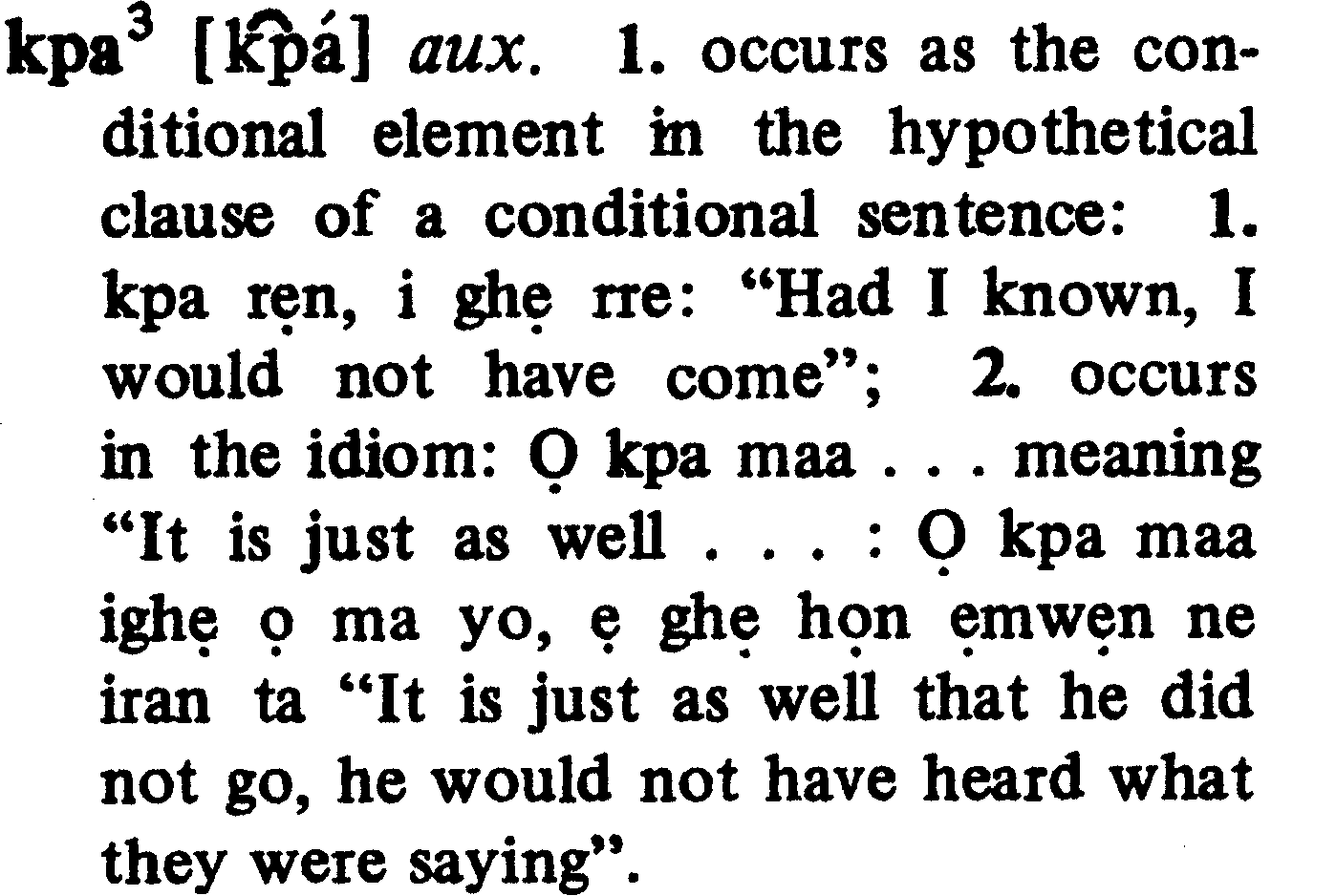
kpaa [k͡pàá] vb. 1. to raise; to lift up:
Kpaa ihẹ na ghee deghẹ ọ khua ―
“Lift up this load to see whether
it is heavy”; 2. to help to carry load:
Gu mwẹn mu ekherhe kpaa ruẹ vbe
ihẹ naa ― “Let me help you to carry
some of this load.”
%%
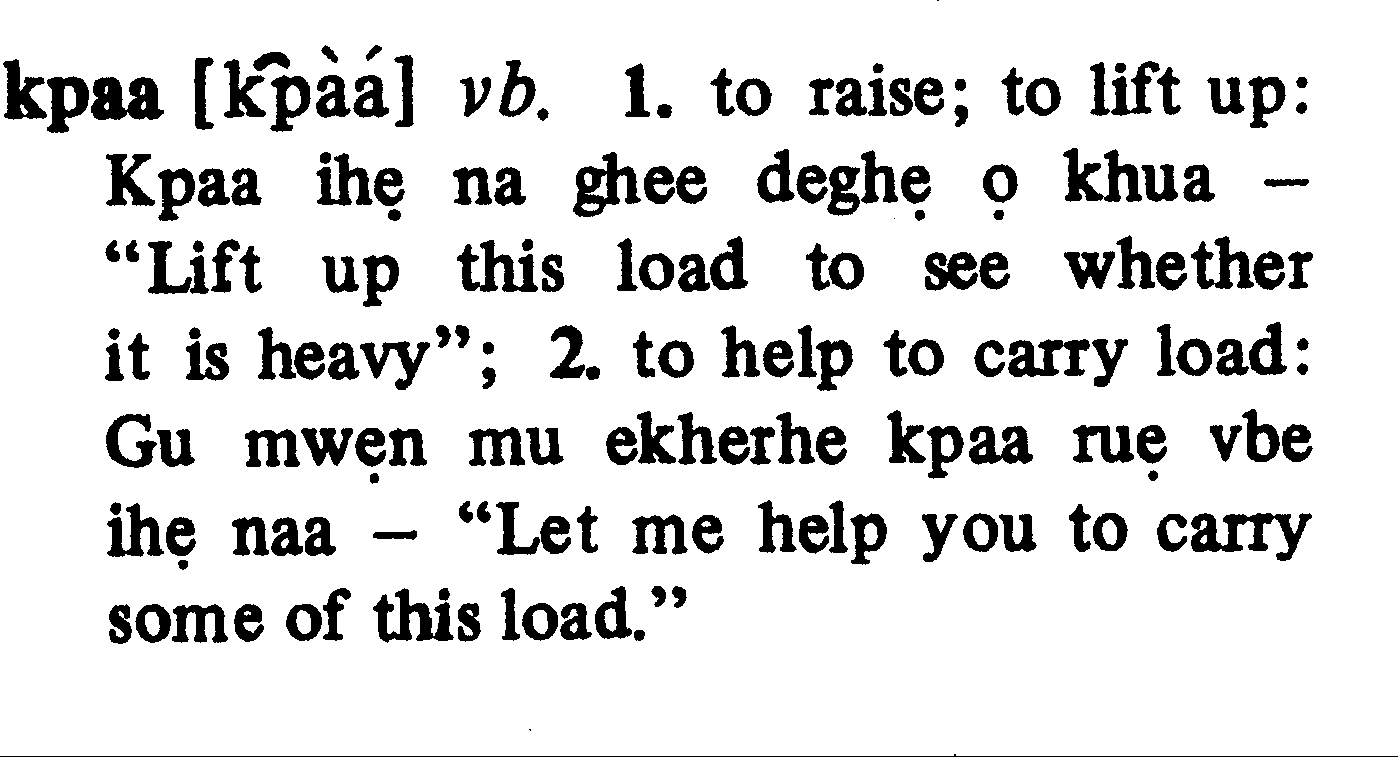
kpaegbe [k͡paègbé] vb. (< kpaa ― egbe)
“to raise body”: to stand up; to rise.

kpaẹn [k͡pã̀ɛ̃́] vb. 1. to yank off (e.g.
branches of a tree); 2. to pluck (e.g.
fruits from a tree); 3. to fall off (by
itself). Abọ ọre kpaẹn fua ― a branch
of it has fallen off.

kpankpanankpan [k͡pã́k͡pã́ã́k͡pã́] adj.
very strong; very hard; extremely
solid: Ọ ye kpankpanankpan ― “It
is very hard”.

kpaikpai [k͡paikpai] adj. very few;
“one in a number”; an occasional
one: Emwan kpaikpai ọ sẹ evba ―
“Only a few people get as far as
there.”
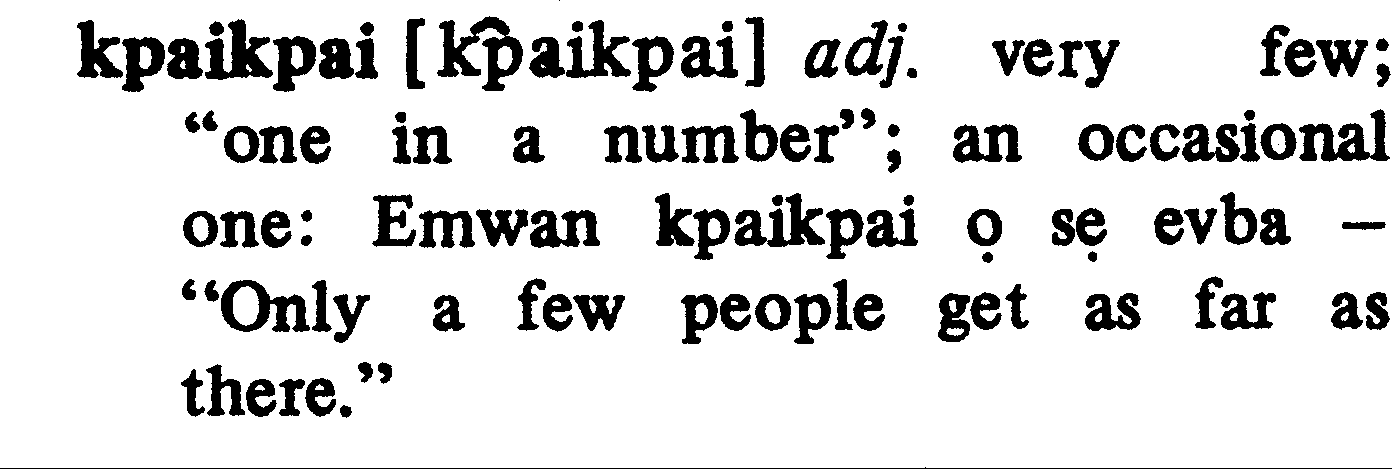
kpakpakpa [k͡pàk͡pàk͡pà] adv. de-
scribes the friskiness of an excited
person or animal: Ọ fi kpakpakpa ―
“He is darting up and down excitedly.”

kpalọ [k͡pàlɔ́] vb. to peel; to strip the
bark off (e.g. a piece of wood or a
tree-trunk): Lahọ, kpalọ alimoi na
mẹ ― “Please peel this orange for
me.”
$Page 090$
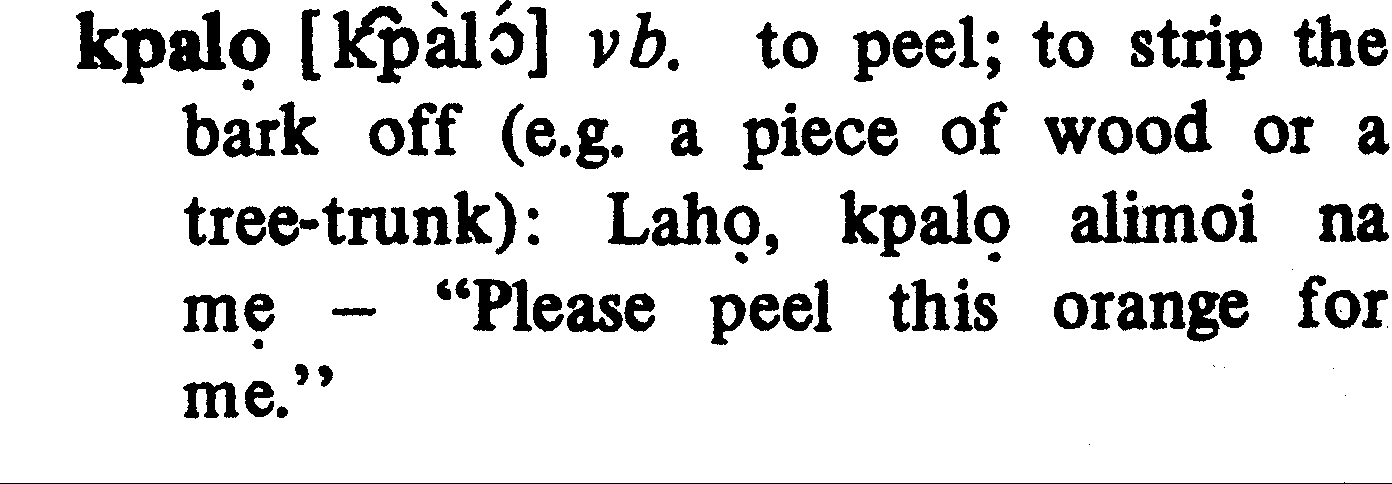
kpannọ [k͡pã̀nɔ̃́] vb. reit. or pl. sense
of kpaẹn: Ebe hia kpannọ vuọn otọ ―
“The leaves have all fallen to the
ground.”

kpannọkpannọ [k͡pã̀nɔ̃̀k͡pã̀nɔ̃̀] adj.
(used with ye) describes a very rough
surface.

kpaọ [k͡pàɔ́] vb. to leave; to depart:
Erhae kpaọ gha rrie Eko ― “His
father left and went to Lagos.”

kpasi [k͡pàsì] adv. describes a manner
of standing: firmly and upright: Ọ
mudia kpasi ― “He stood up straight
and firm.”

kpataki [kpàtàkì] adj. important; sig-
nificant: Ọmwan kpataki nọ vbe
ẹvbo na ― “He is an important
person in this town.”

kpatalẹ [k͡pàtálɛ̀] vb. to defecate (not
in popular use).

kpe [k͡pé] vb. 1. to wash (something):
kpe ọkpan: to wash dishes; to do
dishes. 2. to immunize oneself with
charms against various sources of
harm; 3. to dress a wound: of. kpẹtẹ.

kpee1 [kpèé] vb. 1. to play a musical
instrument: Iran gha kpee ema vbe
odọ ― “They are playing drums
over there.”; 2. to sing and dance in
a procession: Iku kpee dee vbe urria:
“A dance group is approaching in
the distance”.
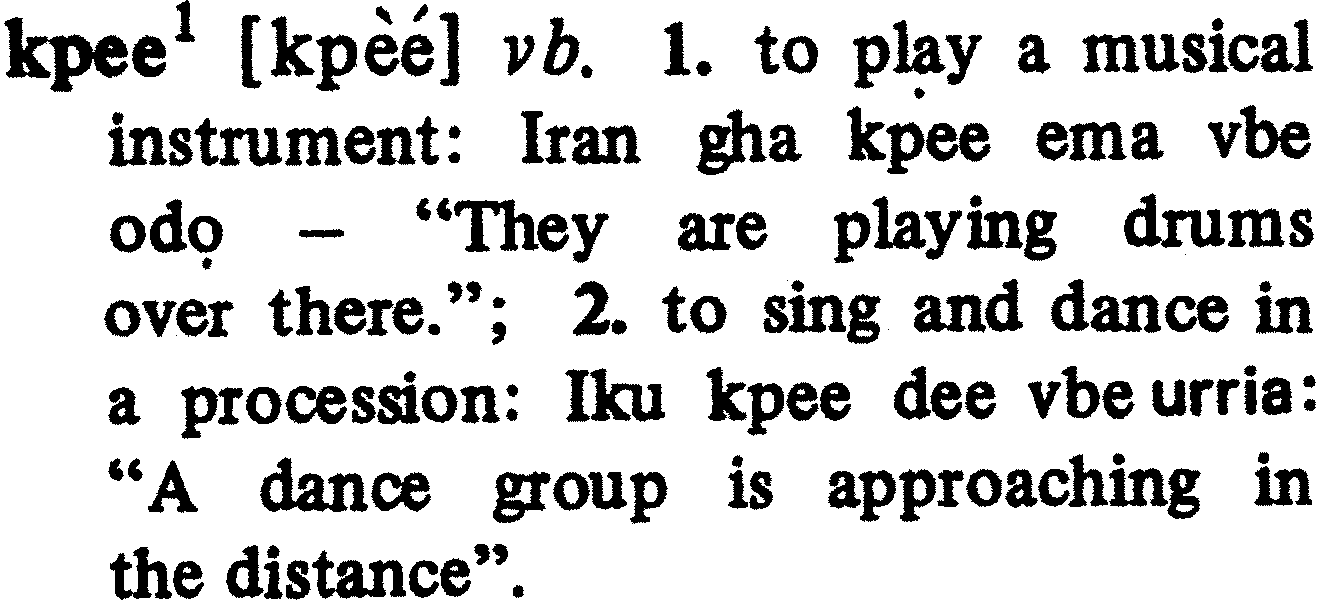
kpee2 [k͡pèé] vb. to blame (somebody)
for something that went wrong; to
accuse of being responsible for a
mishap: Ghẹ kpee mwẹn ighẹ i ma
ren ọkpa, i ma rẹn eva vbe emwin
ne ọ ruẹ ― “Don’t blame me, for
I know nothing about what is wrong
with you.”
%%
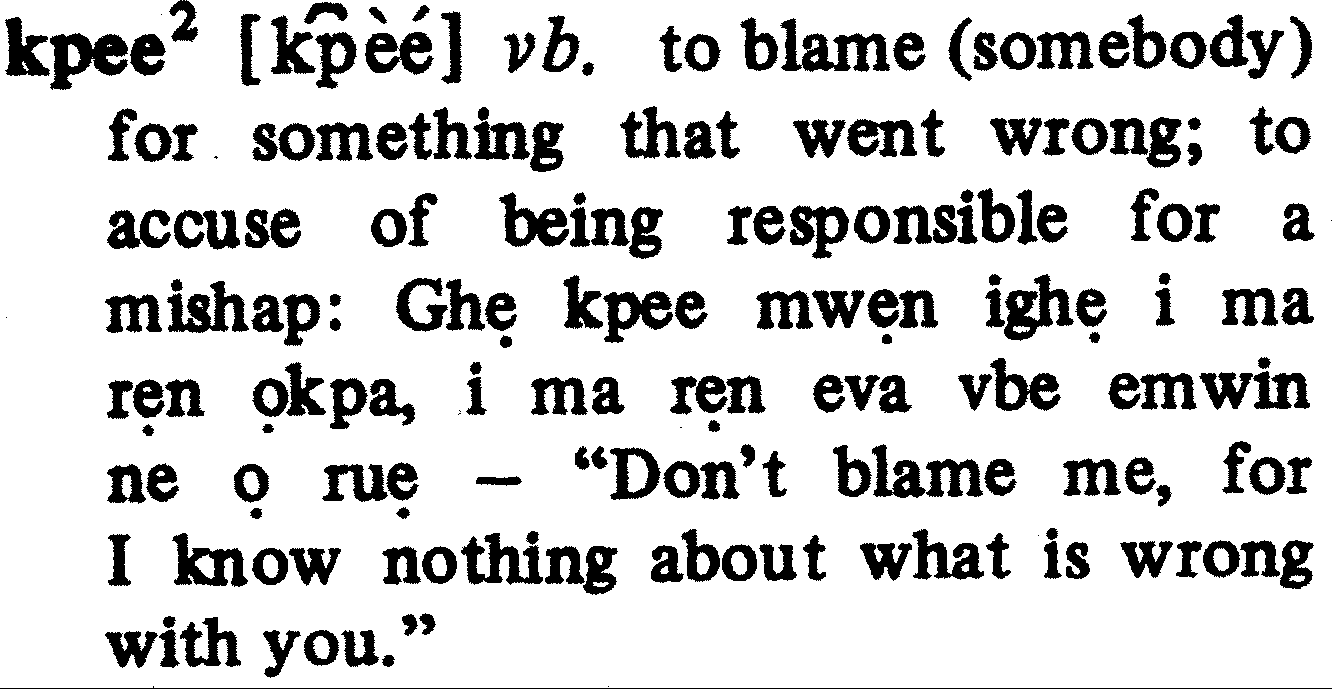
kpee3 [kpèé] vb. to shout continuous-
ly; to scream: Ọ kpee eve rua vbe
ọ ya aro miẹ ọnrẹn ― “She shouted
out a cry when she saw it with her
eyes: She burst out crying when
she set eyes on it.”
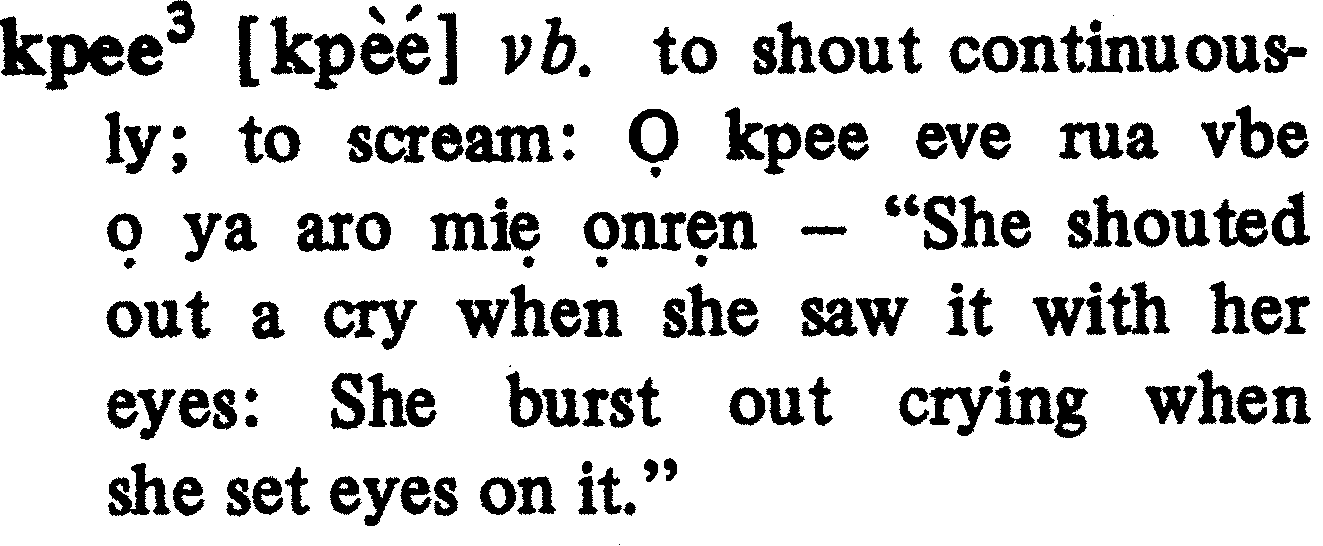
kpee5 [k͡pèé] vb. (with uhunmwun:
“head”): to ache: uhunmwun kpee
mwẹn: “My head is aching me: I
have a headache.”

kpeema [k͡pèémà] vb. (< kpee1 ―
ema) “to play drums”: to drum.

kpeghe [k͡pèɣé] vb. to shake; to sway:
Akọn mwẹn kpeghe ― “My tooth
is shaking.”

kpẹẹ [k͡pɛ̀é] vb. to be a long time,
to remain for long.: Ọ kpẹre vbe
ugbo ― “He was a long time at the
farm.”

kpẹghẹẹ [k͡pɛ̀ɣɛ̀ɛ̀] adj. describes some-
thing that is very smooth: Ukhu egbe
ẹre ye kpẹghẹẹ ― “Her skin is very
smooth.”

kpẹkuru [k͡pɛ̀kùɽù] adj. short.

kpẹkpẹ [k͡pɛ̀k͡pɛ́] vb. to frequent a
place; to visit frequently. Ọ kpẹkpẹ
vbe owa mwẹn ― “He visits my house
often.”

kpẹn [k͡pɛ̃́] vb. (with iyan or ema): to
harvest. Iran gha kpẹn iyan vbe
ugbo ― “They are harvesting yams
at the farm.”

kpẹnrẹn [k͡pɛ̃́ɽɛ̃́] adj. of very limited
value; not much: Ẹghe kpẹnrẹn ẹre ọ
$Page 091$
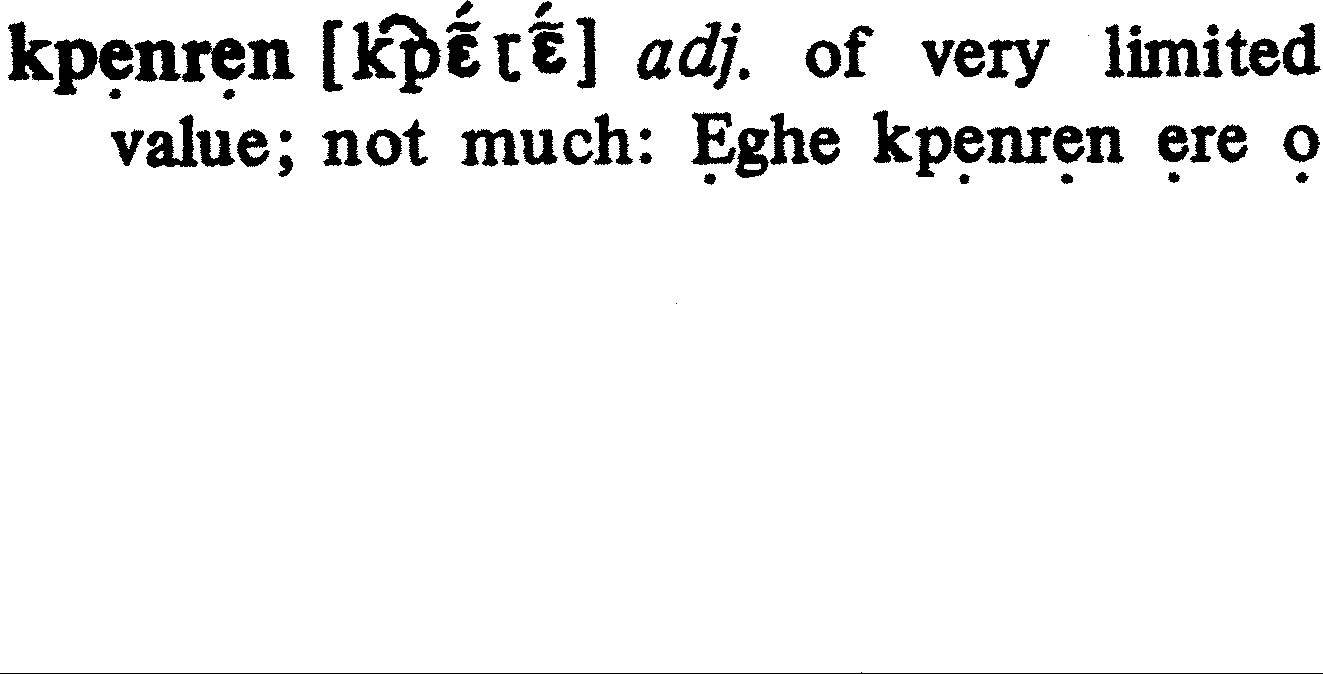
gbe vbe evba ― “It was a very short
time that he spent there.”

kpẹtẹsi [k͡pɛ̀tɛ́sì] n. cf. ekpẹtẹsi.

kpẹwẹkpẹwẹ [kpɛ̀wɛ̀kpɛ̀wɛ̀] adj. un-
healthily; puffy: irho kpẹwẹkpẹwẹ ―
“puffy cheeks.”

kpigho [k͡píɣò] vb. (< kpe-ìgho) “to
wash horns”: (idiom) to struggle (with
somebody); to compete (with some-
body): Iran vbe arowa re gha kpigho ―
“He is having a struggle with his
master.”
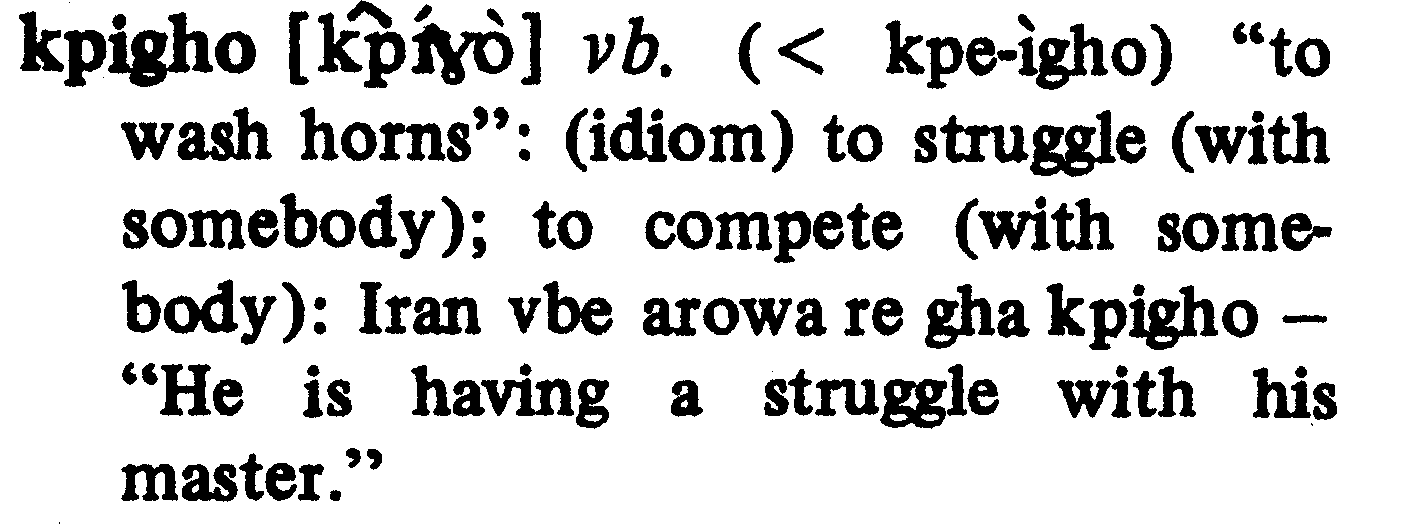
kpiii [kpììì] adv. describes a loud ap-
plause by a crowd. (also tiii).

kpogho1 [k͡pòɣó] vb. to be loose; not
tight: Italawẹ na kpogho vbe ẹkun
mwẹn ― “These trousers are loose
around my waist.” (also logho).

kpogho2 [k͡pòɣó] vb. to make a solu-
tion; to prepare a liquid mixture:
Kpogho ukhunmwun nẹẹn nẹ ọ wọn ―
“Mix a solution of medicine for
him to drink.”

kpokpo [k͡pòk͡pó] vb. to worry (some-
body); to harass; to disturb.

kpola [k͡pòló] vb. 1. to sweep; 2.
to gather (things) together; to assemble
(things): Emwin hia ma ghi mwẹn
vbe owa, avbe oyi kpolo ehia, iran
viọre. “All the things that we have
in the house, the thieves assembled
all and took away”; (cf. koko1).
%%
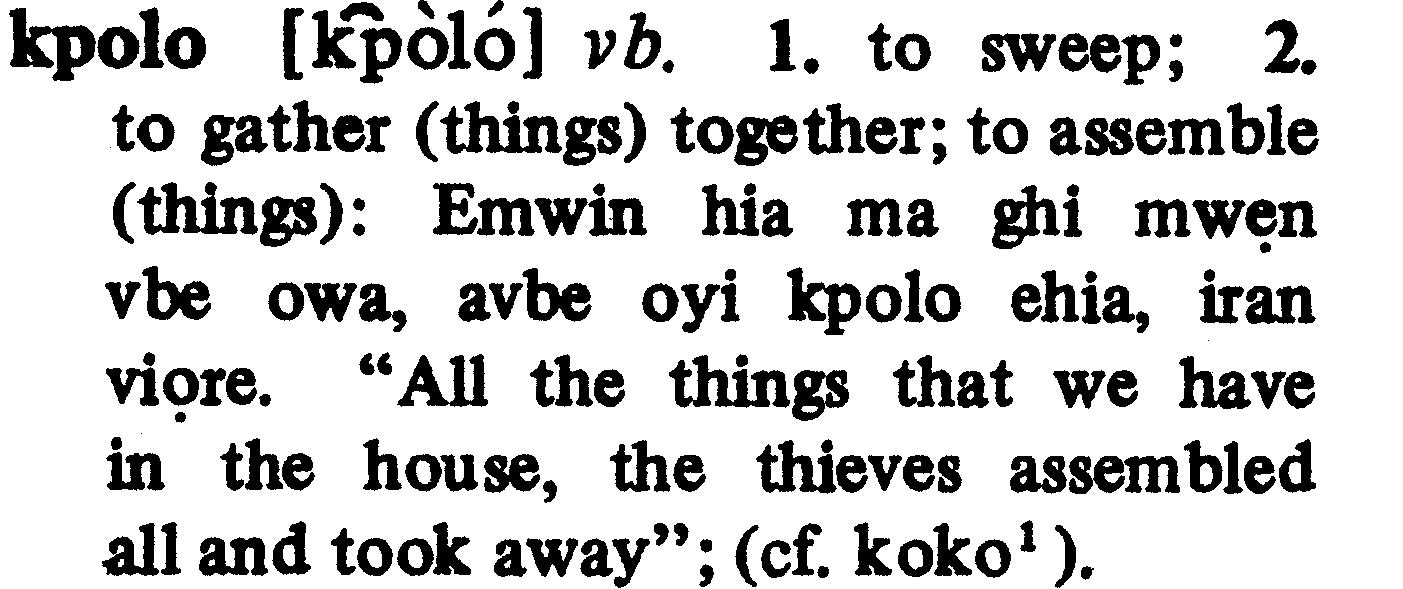
kpoo1 [k͡pòó] vb. to sink; to give way
(e.g. of the ground): Otọ kpooro vbe
iyekowa ― “The ground sank in
the backyard.”

kpoo2 [k͡pòò] adv. describes intensity
of brightness, (e.g. of a flame): Erhẹn
baa kpoo ― “The fire is flaming very
brightly.”

kpoorhu [k͡pòórhù] vb. (< kpee-urhu)
“to shout voice”: to preach.

kpọ [k͡pɔ́] vb. to be plentiful; to be
in large supply: Evbare waa kpọ vbe
ẹvbo na ― “Food is in large supply
in this town.”

kpọkọ [k͡pɔ̀kɔ́] vb. to dribble; to emit
saliva: (of infants, after a meal.)

kpọkpọọkpọ [k͡pɔ́kpɔ́ɔ́kpɔ́] adv. (usu-
ally with hunwan: to be silent) total
silence: Iran hunwan kpọkpọọkpọ ―
“They maintained total silence.”

kpọlọ [k͡pɔ̀lɔ́] vb. to be large; big; huge.
Owa ne ọ bọe waa kpọlọ ― “The
house he built is quite large.”

kpọnrọnkpọnrọn [k͡pɔ̃̀ɽ̃ɔ̃̀kpɔ̃̀ɽ̃ɔ̃̀] adj.
(with aro: eye) protruding: Ọ ru
aro kpọnrọnkpọnrọn vbe aro ẹkirẹ ―
“He has protruding eyes like those
of a frog.”

kpọnmwẹn [k͡pɔ̃̀ɱɛ̃́] vb. to thank; to
give thanks to: Ọ kpọnmwẹn mwẹn
ye iyobo ne i rhie nẹẹn ― “He thanked
me for the help I gave him.”
